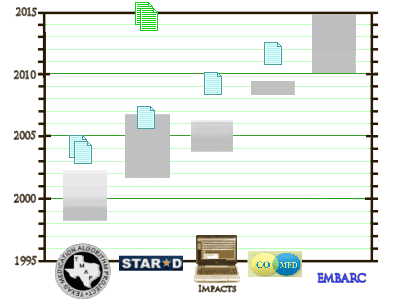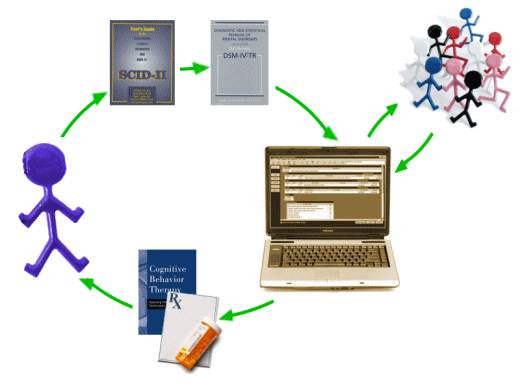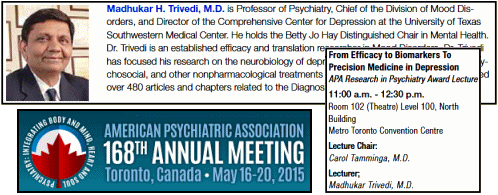By the beginning of 2011, I was finally catching on to the extent of the the problem with the Psychopharmacology literature. I had written a sarcastic post about inventing a computer to generate Clinical Trials mixing every drug with every condition [NIMH·receptalator…] and I got a comment from someone in Texas pointing out that such a computer program was already proposed. It was a paper by Madhukar Trivedi at UT Southwestern. He had written a computer program to implement an algorithm driven treatment of Major Depressive Disorder on an NIMH grant. The paper was talking about his attempted Clinical Trial [IMPACT] to test the algorithm. He’d had to abandon the Trial, because the clinic doctors wouldn’t use the computer unless Dr. Trivedi was there looking at them. In the paper, he was speculating about why they wouldn’t use it [strange bit of psychologizing for a biological psychiatrist, I thought]. Then I looked at his COI declaration [see evidence-based medicine I…] and my jaw fell to the floor. That’s when I started blogging consistently about the pharmaceutical invasion of psychiatry. I’d never seen anything like that before.
I had found that five year grant for IMPACT [MH064062] which had been paid out at a total of $3.3 M [which seemed like a lot for a study that never happened]. Working backwards got me to STAR*D. While it had >100 articles, they never published the results of the Primary Outcome Variables – just some secondary rating scales [see a thirty-five million dollar misunderstanding…]. Yes, it cost $35 M in all and essentially told us very little about treatment. Moving further back in time, I ended up at TMAP, with Trividi in c harge of nthe Mood Disorder Algorithms. And that opened up learning about the biggest industry/psychiatry scam of them all, TMAP – getting in-patent drugs into the State formularies was a gold rush for PHARMA. Somewhere back around 2008, John Rush left UT for the Duke Program in Singapore. At that time, Trivedi inherited all the NIMH Projects at UT. He finished up CO-MED, a negative study involving combining antidepressants. Then he got a NIMH Grant for a project of his own [EMBARC] to look for biomarkers that discriminated between Zoloft or Wellbutrin responders – a personalized medicine quest of dubious value at best. The NIMH has paid out $9+ M so far, the grant cycle has elapsed, and yet it’s currently listed as still recruiting on ClinicalTrials.gov. Altogether, I’d say the four NIMH studies [STAR*D, IMPACT, CO-MED, and EMBARC] came to well over $50 M total.

As you can see, it’s become something of a hobby of mine, following Dr. Trivedi’s projects since that first one in 2011. He’s very adroit at getting NIMH funding, though he’s less adept at finishing the projects. He actually completed CO-MED as advertised. Other than that, STAR*D, IMPACT, and EMBARC never got published as the completed research they were funded to be, though there were plenty enough papers generated by STAR*D for a small library. And TMAP just quietly faded away after almost bankrupting the Texas Mental Health budget [bailed out by Governor George Bush prior to leaving for Washington]. In Dr. Trivedi’s defense, the gross corruption and PHARMA collusion exposed had to do with the Atypical Antipsychotics rather than with Dr. Trivedi’s Antidepressant algorithms, though I don’t know that the Antidepressant part of TMAP received a thorough vetting.
UTSouthwestern Medical Center: NewsroomMay 18, 2015
DALLAS – Dr. Madhukar Trivedi, Director of the Center for Depression Research and Clinical Care at UT Southwestern Medical Center and an internationally recognized expert in depression and mood disorders, is receiving the 2015 American Psychiatric Association Award for Research, the Association’s most significant award for research. First awarded in 1949 as The Hofheimer Prize, the award is given in recognition of a single distinguished contribution, body of work, or lifetime contribution that has had a major impact on the field and/or altered the practice of psychiatry, according to the American Psychiatric Foundation, which identifies the awardees. Dr. Trivedi, Professor of Psychiatry and Chief of the Division of Mood Disorders at UT Southwestern, will present an honorary lecture May 18 at the APA Annual Meeting in Toronto…
Dr. Trivedi previously served as one of the Principal Investigators of the Sequenced Treatment Alternatives to Relieve Depression [STAR*D] study, which at the time was the largest and longest study on the treatment of major depressive disorder and is considered a benchmark in the field of depression research. Dr. Trivedi also helped author innovative treatment guidelines called the Texas Medication Algorithm Project [TMAP], a set of comprehensive management tools for doctors treating severely mentally ill patients within Texas’ publicly funded mental health care system.
He also served as Principal Investigator for NIMH grants examining treatment for chronic depression, identifying specific signaling proteins found in blood cells that may predict whether a depressive person will respond better to workouts or medications, a computerized decision support system for depression, and one using specific antidepressant combinations to increase remission rates by treating a broader spectrum of depressed patients and by capitalizing on additive pharmacological effects…
He has served on speakers bureaus for Abdi Brahim; Akzo (Organon Pharmaceuticals Inc.); Bristol-Myers Squibb Company; Cephalon, Inc.; Cyberonics, Inc.; Forest Pharmaceuticals; GlaxoSmithKline; Janssen Pharmaceutica Products, LP; Eli Lilly & Company; Pharmacia &; Upjohn; Solvay Pharmaceuticals, Inc.; and Wyeth-Ayerst Laboratories.
The study chart above is all government funded research aiming to making direct recommendations to clinicians about how they should treat patients using Guidelines and Algorithms. It is not possible for someone with that level of Conflict of Interest to make unbiased recommendations. In my estimation, no-one with those competing interests should have ever received NIMH grant support in the first place.
At the Mayflower Conference, on Personalized Medicine in October 2009, Dr Trivedi said: “… clinicians have to decide on treatments and therefore the best goal, interim goal at least, we may want to understand the pathophysiology better and I’m not against that, but I think we have to help clinicians decide on one versus the other treatment." I disagree. The body of that work aims to tell clinicians what choices to make rather that give them the accurate efficacy, safety, and pathophysiologic information to make these decisions in concert with their patients. After reading that first article, I made this sketch:


we let it happen.
we shouldn’t have stood and watched twenty-thirty years ago when all these miracles were being declared.
as you showed in one of your older posts re: seroquel, the marketing team was clearly more important than the research.
http://1boringoldman.com/index.php/2014/05/21/a-mockery/
what this showed me was that they had trouble outperforming fifty-year old haldol. to me says more about the difficulty in designing effective drugs, and how haldol seemingly held a strong position for multiple decades that likely invoked greed and jealousy from rivals.
we didn’t stop it and now we see our passivity lead to abuse by the entities who were alleging psychiatric miracles every few years.
i don’t care what ‘psychopharmacologists’ say. the mind-body dichotomy is extremely nuanced, and regardless of how that argument shakes out (volition, duality, etc) i will say one thing: i believe the chemical cascade is a consequence of the underlying electrical impulses responsible for inducing them.
http://www.psychiatry.org/File%20Library/Learn/Archives/rd2012_Neuroimaging.pdf
i wish we could take our field back, but the motives are absolutely crazy. i remember reading a biomarker apa study that showed no progress, yet i can assert that this abject failure is one of the reasons i’ve experienced such difficulties.
if only they spent the same amount of money on training quality practitioners who reduce the burden on the economic system by rehabilitating those who are unable to ‘normally’ (to an extent, of course) function in society.
sick
Enjoyed meeting you at Stratton`s.
Interesting Website. Look forward to reading future issues.